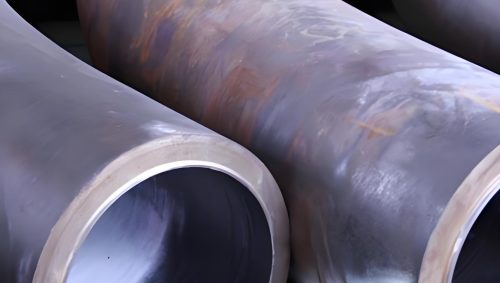Introduction to Inconel 718 and Its Importance in High-Temperature Applications
Tuesday, 14 January 2025
Introduction to Inconel 718 and Its Importance in High-Temperature Applications Inconel 718 is a high-performance nickel-based superalloy known for its excellent mechanical properties, particularly in extreme environments such as high-temperature and high-stress conditions. Widely used in aerospace, power generation, and industrial applications, this alloy is specifically renowned for its ability to withstand high-temperature oxidation, creep,
- Published in Technology
Acceptance Criteria for Super Alloy Steel Pipe Welds
Friday, 10 January 2025
Comprehensive Outline for: “Acceptance Criteria for Super Alloy Steel Pipe Welds” Below is a detailed and structured outline to create a long-form article covering the topic thoroughly: Main Heading Subheading 1. Introduction – Overview of Super Alloy Steel Pipes – Importance of Weld Quality in Critical Applications 2. Understanding Super Alloys – What are Super
- Published in Technology
Passivation of Stainless Steel Pipe — What Is It and How Does It Work?
Monday, 06 January 2025
Passivation is a chemical process used to enhance the corrosion resistance of stainless steel surfaces, including stainless steel pipes. The process removes contaminants and promotes the formation of a protective oxide layer that shields the steel from environmental factors that could lead to corrosion. What Is Passivation? Passivation refers to the creation or restoration of
- Published in Technology
Comprehensive Analysis of LSAW Pipe / JCOE Pipe Products: Manufacturing, Standards, Applications, and Market Trends
Thursday, 12 December 2024
Comprehensive Analysis of LSAW Pipe / JCOE Pipe Products: Manufacturing, Standards, Applications, and Market Trends Introduction The LSAW Pipe (Longitudinally Submerged Arc Welded Pipe), also referred to as JCOE Pipe, is a widely used type of steel pipe with a unique welding process that makes it suitable for high-demand applications in industries such as oil
- Published in Pipes, Technology
Production of Pipe Bending by the Induction Bending Process
Sunday, 24 November 2024
Production of Pipe Bends for Power Stations by the Induction Bending Process Introduction Pipe bending is a critical process in the construction and operation of power stations, where complex piping systems are required to transport steam, water, and other fluids under high pressure and temperature. Among the various pipe bending techniques available, the induction bending
- Published in NEWS, Technology
Buckling failure mechanism of liner pipe in bimetal mechanical clad pipe under complex loading
Wednesday, 23 October 2024
Exploring the buckling failure mechanism of liner pipes in bimetal mechanical clad pipes under complex loading conditions is crucial for understanding their structural integrity and reliability, especially in demanding applications such as oil and gas transportation. Bimetal mechanical clad pipes combine the advantages of two different materials, typically a corrosion-resistant alloy as the liner and
- Published in Technology
The Ratcheting Behavior of Plain Carbon Steel Pipe Elbows Subjected to Simulated Seismic In-Plane Bending
Wednesday, 02 October 2024
The Ratcheting Behavior of Plain Carbon Steel Pipe Elbows Subjected to Simulated Seismic In-Plane Bending Introduction In the realm of structural engineering, understanding how materials behave under stress is crucial, especially in seismic-prone areas. Pipe elbows, often made from plain carbon steel, are integral components in piping systems, allowing for directional changes in fluid flow.
- Published in NEWS, Technology
Dimensions of PN10 necked flat welding flange EN1092-1
Monday, 30 September 2024
How to Find Dimensions for a PN10 Necked Flat Welding Flange Obtain the Standard: Acquire a copy of the EN 1092-1 standard, which details dimensions for various flanges. Key Dimensions to Look For: Outer Diameter (OD) Bolt Circle Diameter (BCD) Number and Size of Bolt Holes Flange Thickness Neck Diameter Neck Length Contact
- Published in Technology
The Advantages of Nickel Alloy Cladding in Industrial Piping Solutions
Saturday, 28 September 2024
The Advantages of Nickel Alloy Cladding in Industrial Piping Solutions Introduction In the ever-evolving landscape of industrial engineering, the quest for materials that can withstand harsh environments while maintaining structural integrity is ongoing. Among the myriad of solutions available, nickel alloy cladding has emerged as a formidable choice in industrial piping solutions. This article delves
- Published in Technology
x120 Line Pipe Formation through JCOE Technique (part.3)
Thursday, 26 September 2024
Line Pipe Formation through J-C-O-E Technique Introduction The formation of line pipes using the J-C-O-E technique is a meticulous process that transforms TMCP (Thermo Mechanical Controlled Processing) and accelerated cooling processed plates into line pipes. This transformation involves several stages, each critical to achieving the desired pipe dimensions and weld quality. The J-C-O-E process, named
- Published in Technology
Formation of X120 M Line Pipe through JCOE Technique (part.2)
Tuesday, 24 September 2024
Formation of X120 M Line Pipe through JCOE Technique Introduction The formation of X120 M line pipe using the JCOE technique is a sophisticated process that involves precise control over shaping and welding operations. This process is critical for ensuring the structural integrity and performance of line pipes used in demanding applications such as oil
- Published in Technology









